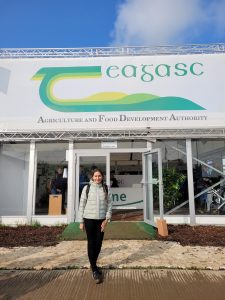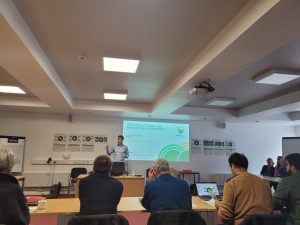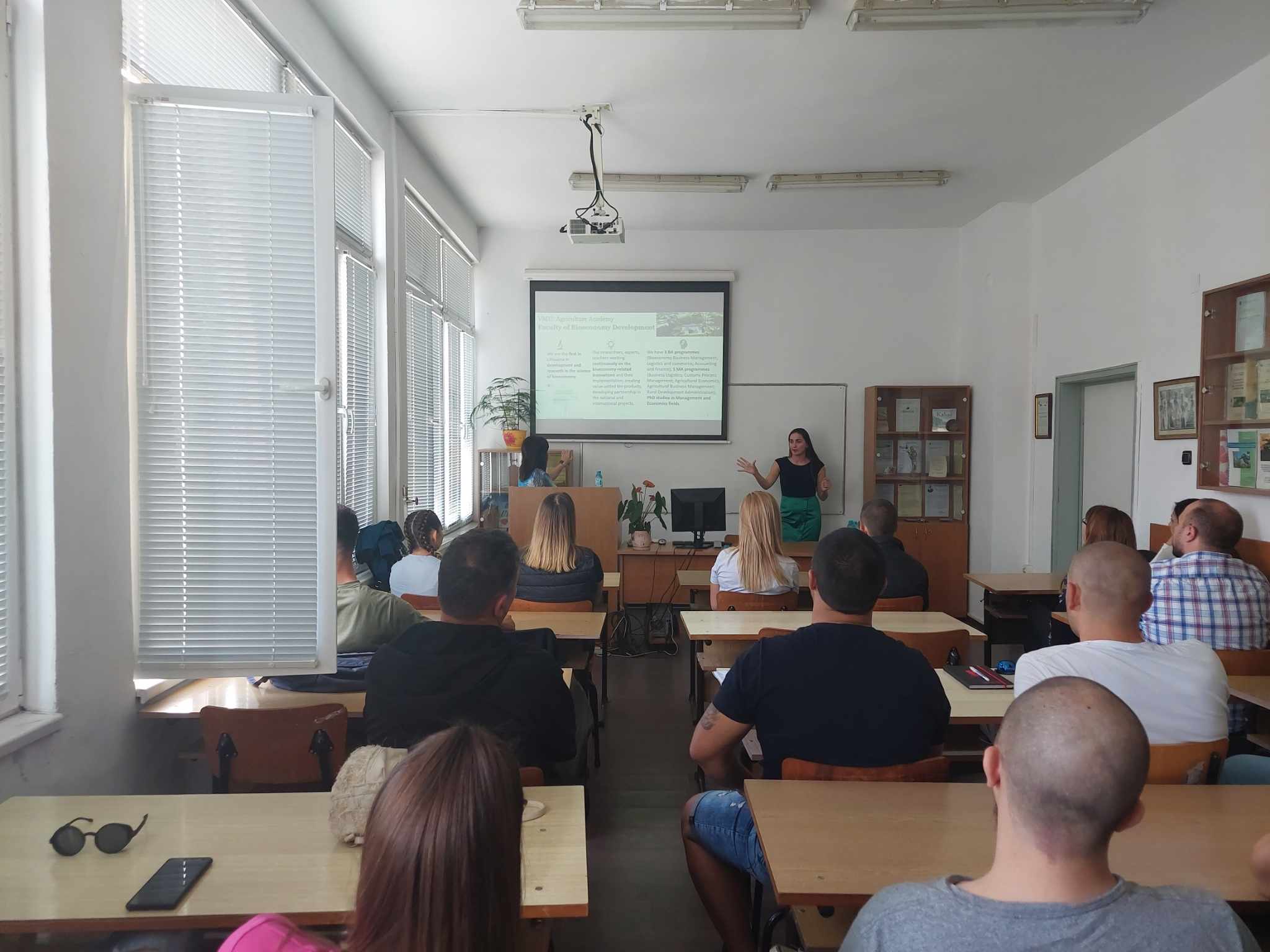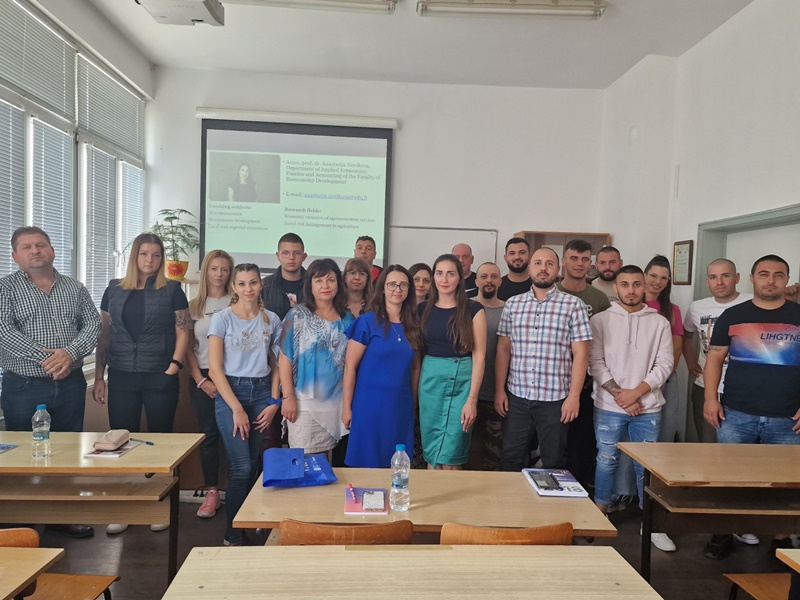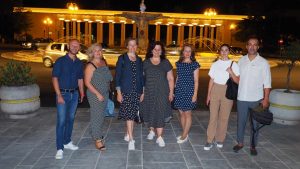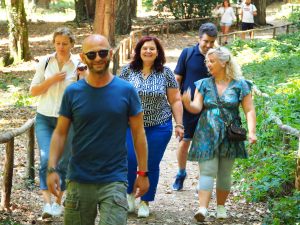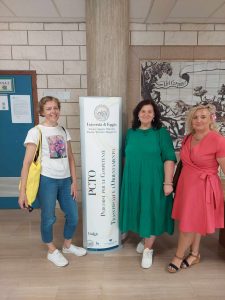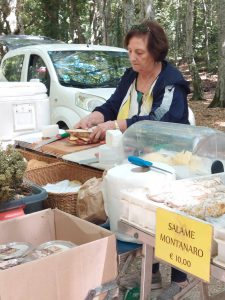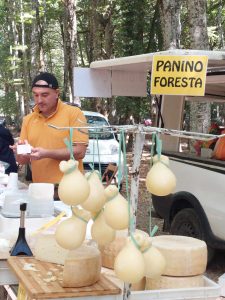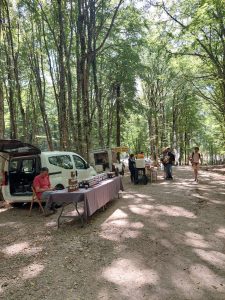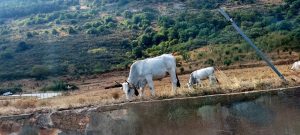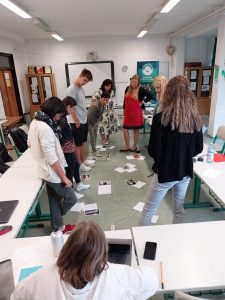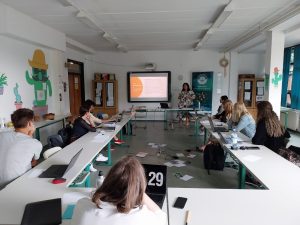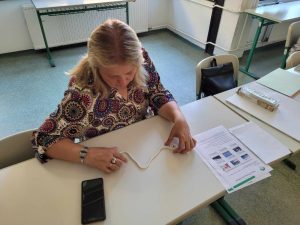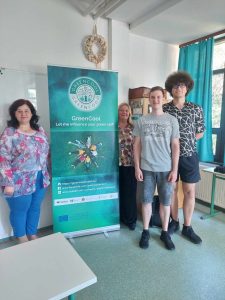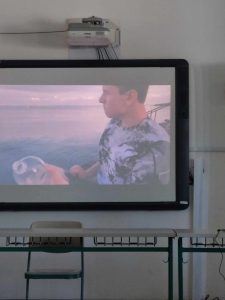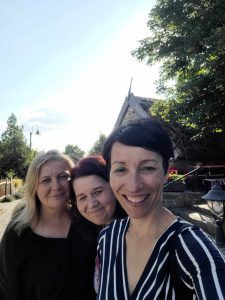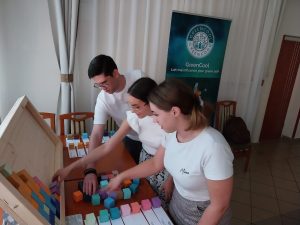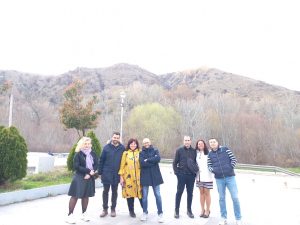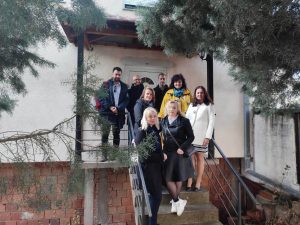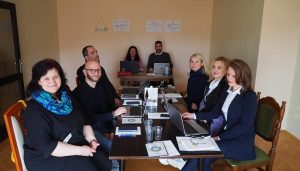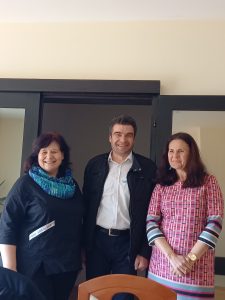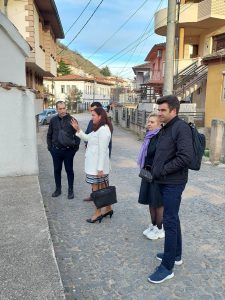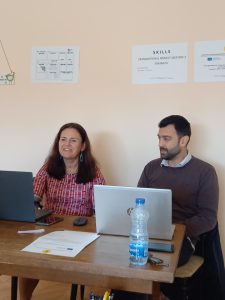CONFERENCE “YOUNG SCIENTIST 2024”
The 21st annual conference of young scientists “YOUNG SCIENTIST 2024” organized by the Vytautas Magnus University Agriculture Academy (VMU AA) will be held on April 11 2024 remotely. The conference is intended for the first, second and third degree students. The purpose of the conference is to involve students in scientific activities, develop the ability to publicize scientific research results, present their scientific research achievements and discuss topical issues of bioeconomy, green course, climate change, ecosystem sustainability, rational use and protection of natural resources.
There is no conference fee for students. Certificates of conference participants will be awarded to the speakers of the conference.
Speakers will be able to publish articles in the collection of articles of the conference “YOUNG SCIENTIST 2024” or in another scientific publication, for example, in the scientific journal „Agricultural engineering“ or another, after submitting articles that meet the requirements for articles in a scientific publication.
| Conference topics | Subtopics |
| Bioeconomy | Accounting and finance: challenges and opportunities |
| Bioeconomy, sustainability of agriculture and food sector | |
| Innovations and solutions in business logistics | |
| Management of agri-business and other bioeconomy business organizations | |
| Sustainable development of rural areas | |
| Biosystems engineering | Energy engineering |
| Land management | |
| Mechanical engineering | |
| Technology engineering | |
| Transport engineering | |
| Water engineering | |
| Sustainability of agricultural, forest, and water ecosystems | Agronomy |
| Food quality and safety | |
| Sustainability of agricultural ecosystems | |
| Ecosystem services | |
| Sustainable forestry | |
| Wildlife population management |
Pre-registration for the conference until February 15, 2024.
Articles for the conference “YOUNG SCIENTIST 2024” are accepted until March 8, 2024. (the link to upload the article). The articles must be prepared according to the recommendations for the authors of the articles (Annex 1_Article template, Annex 2_Authors guarantee letter).
Contests for Teaching and Training Visits under Erasmus+ Programme
International Cooperation Department invites all VMU academic and non-academic staff members to participate in the Erasmus+ contests: the contest for Erasmus+ teaching visits in Programme countries (EU/EEA countries) and the contest for Erasmus+ teaching and training visits in Partner countries (non-EU/EEA countries). The visits will be conducted in the 2023/2024 academic year.
The aim of the teaching visit is to read lectures for students of a university abroad and attract them to study under Erasmus+ at Vytautas Magnus University.
The aim of the training visit is to participate in training events held abroad (except for conferences) or do work internship (observe work, participate in training activities) in universities abroad. This activity encourages professional development of academic and non-academic staff.
The announced contests are:
- Contest for Erasmus+ teaching visits in Programme Countries (EU/EEA)
- Contest for Erasmus+ teaching and training visits in Partner Countries (non-EU/EEA)
VMU lecturers and employees are invited to apply for contests until December 1st. The selection criteria and requirements for applications are provided in the descriptions of the contests.
More information is provided by the VMU International Cooperation Department (erasmus@vdu.lt).
More information about teaching visits
More information about training visits
THE FIRST SUMMER SCHOOL OF SAFEHABITUS PROJECT
Researchers Dr. Anastasija Novikova from the Faculty of Bioeconomy Development and Dr. Gediminas Vasiliauskas from the Faculty of Engineering at Vytautas Magnus University’s Agriculture Academy participated in the first SafeHabitus project’s“ Strengthening Farm Health fnd Safety Knowledge and Innovation Systems ” summer school from September 20 to 22, 2023. This three-day summer school brought together 40 specialists from European Union countries who shared their country’s experience and knowledge on the safety and health of agricultural workers and the challenges they face.
The summer school focused on sharing knowledge and experience of the diversity of challenges faced by farmers across the EU. Whilst many of the risks are similar, e.g., tractors, machinery and livestock, the context in which safe farm practices can be developed and promoted is varied. The main aim of the Summer School was to support the establishment of the ‘Communities of Safe Farm Practice (CoPs) to address these issues, laying a strong foundation for collaborative efforts.
The goal of SafeHabitus CoPs is to empower farm health and safety actors and relevant stakeholders, to increase learning and exchange knowledge, to co-design and pilot practical solutions for occupational health and safety and assess their implications for farmers, farm workers, farm stakeholders and rural communities. Each Communities of Practice will identify and work on specific needs and topics in their national/regional context.
Participants visited the National Ploughing Championships to see different approaches to a range of farm safety and farmer health challenges that have been developed in Ireland. These included meeting with Ms Alma Jordan, a social entrepreneur, who established AgriKids to enhance the safety of children on farms by working with primary schools, to live demonstrations of safe use of farm machinery by the Health and Safety Authority of Ireland. Participants also heard from EmbraceFarm and Macra about programmes that have been developed to support the wellbeing of farmers and farm families.
Erasmus Teaching Visit in Bulgaria
Associated professors dr. Erika Besusparienė and dr. Anastasija Novikova from the Faculty of Bioeconomic Development at Vytautas Magnus University Agriculture Academy (VMU AA) successfully completed a teaching visit in Bulgaria at the D.A. Tsenov Academy of Economics, located in Svishtov on the right bank of the Danube River from October 2 to 6, 2023. During this visit, they had the opportunity to collaborate with local colleagues, participate in lectures, and share their knowledge on the importance of bioeconomic development and international trade tax policy.
Assoc. prof. dr. A. Novikova had lectures in the Department of Agricultural Economics, actively sharing her expertise on the significance of bioeconomic development. Her lectures were not only for students but also for teachers of department. She discussed how the bioeconomy sector is becoming increasingly vital and its potential contribution to sustainable economic development. Assoc. prof. dr. A. Novikova engaged with students in discussions on ways to enhance Bulgaria’s agriculture sector for greater economic efficiency and environmental sustainability.
Assoc. prof. dr. E. Besusparienė, who lectured in the Department of Control and Analysis of Economic Activities, focused on international trade tax policy. Her lectures were tailored to help students understand how tax policies impact international trade. She provided a comprehensive overview of different tax measures and their application in international trade. Furthermore, she discussed current issues and recent changes in international trade tax policies, ensuring that students could easily grasp and absorb the information.
Both associated professors also had the opportunity to explore the Customs laboratory class at D.A. Tsenov Academy of Economics, where special software allows students to submit customs declarations in real-time and simulate real-world business scenarios. This practical experience was invaluable for students, offering them insights into customs procedures.
Additionally, during this teaching visit, detailed discussions took place regarding further collaboration opportunities between institutions that can benefit students, faculty, and researchers from both universities. These discussions laid the foundation for strengthening ties between the two academic institutions.
One of the significant opportunities discussed is student exchanges through the Erasmus program. This presents an excellent opportunity for students from VMU AA Faculty of Bioeconomic Development, particularly those studying Accounting and Finance, Agricultural Economics, or Customs Process Management. These exchanges enable students to experience a different country’s higher education system, gain exposure to different cultures, and acquire valuable international perspectives.
Faculty members can also take advantage of this Erasmus collaboration opportunity. They can exchange knowledge, experience, and teaching methods, contributing to the quality of higher education and fostering international academic cooperation. This allows professors to offer new perspectives and knowledge to their students.
The collaboration can also expand research opportunities for researchers and academics to participate in international projects, conduct scientific research, and contribute to the growth of the international scientific community.
This teaching visit to Bulgaria has opened a remarkable opportunity to strengthen relationships and develop cooperation between the two institutions. It promises to benefit students, faculty, and researchers from both universities. It serves as an excellent example of how international collaboration can promote education and scientific development, helping shape the future vision of higher education.
GOOD PRACTICES OF GREEN SKILLS DEVELOPMENT
Both researchers and practitioners pay a lot of attention to the search for sustainable, environmentally friendly solutions and their effective implementation. Despite the cultural and economic differences between different countries, it is still easier for scientists to find common agreements on concepts, principles, and tools. In theory, sustainable solutions create competitive advantages for both companies and regions. However, the implementation of green solutions in practice faces different challenges in each country. And their implementation is already becoming more individualized, depending on the natural, economic, cultural and social characteristics of the country or region.
Vytautas Magnus University Agriculture Academy Bioeconomy Development Faculty Researchers prof. dr. V. Atkočiūnienė, assoc. prof. dr. G. Vaznonienė, lecturer dr. I. Kazlauskienė, assoc. prof. dr. J. Zaleckienė and lecturer A. Aleksandravičius participate in the implementation of the international ERASMUS+ project ” Strengthening Key Competencies in Agriculture for Value Chain Knowledge” (2021-1-EL01-KA220-HED-000023289). Faculty researchers – contribute to improving the skills of target beneficiaries (agricultural producers, students) by implementing and promoting the concepts of circular agriculture and green growth.
Project partners: Panepistimio Aigaiou (Greece), Association for Internationalization of Education and Science (The Republic of North Macedonia), Asociația de Dezvoltare Intercomunitară Harghita (Romania) and Distretto Agroalimentare Regionale Scrl (Italy).
7-8 of September took place meeting of project partners in Italy, University of Foggia (Italy). During the meeting, the results of the 4th stage of the project were presented and the guidelines for further work were discussed, the research laboratories and the library were visited. The participants of the meeting got better acquainted with the economic activities, natural, agricultural and tourism resources of the Italian province of Foggia, which are being developed by strengthening cultural identity and achieving sustainability.
More than 59 million of the population, of which about 10 percent consists of villagers living in Italy. About 3.8 percent of all employees work in agriculture, they develop about 1145 thousand farms. Small farmers’ farms predominate, as in many EU countries, and there is an aging trend of farmers. The number of organic farms in Italy is one of the largest in Europe. According to this indicator, Italy is fourth among EU countries and eighth in the world. According to Eurostat, certified organic areas in Italy accounted for 15.2% of the total area. Italy’s organic areas have been growing since 2012 and their number almost doubled during the 2000-2018 period.
Farmers sell products grown in Italy through different channels, both to processors of agricultural production and through agricultural cooperatives. Direct sales at farmers’ farms or open-air markets are very popular in this country. We had to visit one during this visit to the Umbra forest. This forest is a nature reserve, a protected area of the Gargano National Park. Due to its high biological and ecological value, since 2017 it has been included in the UNESCO heritage.
The implementation of sustainable solutions is relevant not only in agriculture, but also in other areas of economic activity. Tourism is one of the most important branches of the Italian economy. During the visit, the sea resort of Vjeste was visited, which received Blue Flags for the purity of its waters. This city is quite far from the big Italian cities. This allows us to say that it is possible to implement sustainable solutions in remote, smaller towns and rural areas over a long period of time, but it is quite difficult to implement it in larger places visited by tourists en masse. But this is a problem for the whole world, not just Italy.
After the project partners meeting, it was confirmed once again the significance of the project results of the set of tools, which is being prepared to help farmers, students and other interested parties achieve their professional goals, develop green skills, implement modern technologies and best practices, optimize production processes in the context of sustainability. The training program and tool guide will be developed based on the analysis of the needs and situation of the participating countries, applying the value chain method, in order to strengthen the links between tourism and agriculture, and help agricultural producers to farm more efficiently and sustainably.

MBA Programme Customs Process Management – First on-site Session of a new Programme
Vytautas Magnus University Agriculture Academy (VMU-AA) has launched an intensive online one-year MBA programme, Customs Process Management. The course is designed to prepare high-level managers for the customs industry in both business and the public sector. Associate Professor Erika Besusparienė states that the programme is ideally suited for individuals who aspire to become customs business leaders. The initial meeting of students and professors of the programme demonstrated that the students are enthusiastic to learn by embracing challenges and working together, whilst the professors are receptive to discussions and the dissemination of their knowledge.
First on-site meeting of a new programme
Director of Lithuanian Customs Practitioners Association, and the head of platform CustomsClear Enrika Naujokė highlights the complexity of managing customs processes, emphasizing the need for expertise and focused attention. “I am greatly appreciative of Vytautas Magnus University Agriculture Academy (VMU-AA) for initiating this programme, and I am extremely proud as well. To the students embarking on this programme this year, I wish success and a truly enjoyable learning experience. Thank you to everyone, particularly the lecturers who generously share their expertise and insights”, commented Enrika Naujokė.
Chancellor of Vytautas Magnus University Agriculture Academy, Prof. Dr. Astrida Miceikienė, warmly welcomed all participants of the meeting, expressing her sincere support for the programme. “The primary concept, proposed by Enrika Naujokė, reflects the importance of customs processes and international trade in our increasingly globalized world. I hope that your study process encompasses not only research and lectures, but also offers an enjoyable time spent with good friends, inspiring ideas, and excellent results“, said Prof. Dr. Astrida Miceikienė.
The dean of the Faculty of Bioeconomy Development, Assoc. Prof. Dr. Bernardas Vaznonis, congratulated students and professors on the start of a new academic year and expressed his delight at the establishment of this study programme. He wished the students engaging and rewarding studies which will prove vital not only for their careers but for their future competencies also. The dean advised students to take full advantage of being a part of a motivated group of students alongside the assistance of helpful teachers. “Additionally, I extend sincere thanks to Enrika Naujokė for initiating this study programme and for organising this meeting of students and teachers, especially considering that future studies will be conducted online. Thus, this meeting provides a significant opportunity to acquaint ourselves with one another, to introduce ourselves, and to gain insight into forthcoming tasks,” noted Associate Professor Dr. Bernardas Vaznonis.
Head of the Department of Applied Economics, Finance and Accounting, Assoc. Prof. Dr. Dalia Juočiūnienė, expressed her delight to see all the professors and students. “We are pleased that you have successfully enrolled in this study programme, Customs Process Management. You already know what you want to achieve with this course and what your goals are. Very briefly, I would like to take a moment to express my sincere hope that after this year, you will be able to confidently say that the decision to study here was one of the best decisions of your life. I wish you all the very best,” said Associate Professor Dr. Dalia Juočiūnienė.
Programme for future leaders in the customs business
Associate professor of VMU-AA dr. Erika Besusparienė suggests that the MBA study programme Customs Process Management is intended for individuals who want to seek a career or be leaders in the customs business. “Currently, this is the first MBA study programme in the field of customs knowledge in Lithuania, perhaps even in the European context. In general, master’s studies in the field of customs are faced with two challenges – in some countries, studies are conducted in the national language of the country; in others countries, the customs field is only touched upon as a specialization”, says dr. Erika Besusparienė.
Director of Lithuanian Customs Practitioners Association and , and the head of platform CustomsClear , Enrika Naujokė pays attention that it is symbolic that the study programme starts in a year when the World Customs Organization’s traditional theme for the year is knowledge sharing. This reflects the growing importance of the customs field and knowledge. Academic programmes in the field of customs are relatively recent, so the emergence of this new international programme is very timely.
The field itself is very complex – customs controls cover not only customs legislation but also so-called non-customs legislation. “Customs is on the “front lines” of ensuring that only safe, compliant products enter the market and that the required taxes are duly paid. In addition, today we are all aware of export controls and sanctions, which are also the responsibility of customs. Last but not least, on the Green Deal, customs will play an important role in ensuring that environmentally friendly products enter the markets. Effective controls start with knowledge, which is equally necessary for businesses to ensure that goods do not get stuck at the border or run into problems later on during a customs audit”, observes Enrika Naujokė.
GREENFLUENCE PRACTICE
International Project – 2021-1-HU01-KA220-HED-000027563 GreenCool – Let me influence your green self! – Skill development in the encouragement of mindset towards environmental awareness and sustainable development in the alliance of EcoC.
Project partners: University of Pannonia – Faculty of Business and Economics (Hungary), Militos Consulting S.A. (Greece), West University of Timisoara (Romania), Vytautas Magnus University – Bioeconomy Development Faculty (Lithuania) ir University of Tartu (Estonia).
Lithuanian partnership and activities in the project are being developed by Vytautas Magnus University, Agriculture Academy, Bioeconomy Development Faculty, Business and Rural Development Department researchers dr. Rasa Pranskūnienė, dr.Vilma Atkočiūnienė.
The general goal of the project is to develop environmental awareness among university students and to spread the thought of sustainable development among the widest possible age groups at events that attract large audience. We committed to develop an innovative online course material and to mainstream sustainable development in all curricula for higher education students. Recognizing the convincing power of young influencers, the project aims to reach out to all age groups of audience at cultural events and festivals in the various European Capitals of Culture to encourage environmentally conscious activity and to be active members and beneficiaries of sustainable development. Furthermore our goal is to equip students with communication tools and sustainable attitude to become effective advocates for advancing EU green economy and culture.
One of the tasks of the project is the research of the practices of “Green influencers”, during which information was collected about the tools and methods of influencers (opinion makers) and communication tools and methods, youth communication channels that can be available in the 21st century.
The majority of the respondents use the following social media platforms for communication to get information, post their thoughts and feeling and to follow opinion leaders, friends and influences on various topics. Instagram is the most preferred platform, followed by Facebook, You Tube and TikTok though the last two varies between countries. Interestingly WhatsApp, Telegram and Twitter are country specific. As for communication techniques Instagram considered creative, TikTok considered funny but very powerful if it comes to specific videos (such as green topics), You Tube is perfect for storytelling that is relevant and give audience instantly what they want. Subgroups on FB are for information and event sharing that would take place offline in an action. Snapchat is used by younger kids and mainly in Lithuania, while LinkedIn and Pinterest are rarely used.
The most influential influencers are those who inspire people’s confidence and share unique experiences. Interestingly the majority of the interviewed influencers do not consider themselves influencers but rather opinion-sharers or opinion leaders. In general influencer is someone (on or offline) who shares opinion or does and act that has impact on others who either share further or act upon those issues. Influencers have the skills to mobilise others and set examples for an important issue in the society. They should share daily, realistic image, short visualized stories. The credibility of an influencer is gained by exemplary behaviour and charity deed that is in connection with social issue. Youth follow both local and international influencers (language is not a barrier as 96.5% of the respondents speaks good English) and they follow local but also well known influencers. The influencers themselves want to improve their content and storytelling script video writing skills.
Based on the results of the conducted research, it is proposed to include 12 communication tools and 10 green issues in the ECOC Greenfluencer program.
| Communication techniques and structure of discourse: | Green topics: |
| 1. Storytelling on and offline
2. Blogging/glossary writing 3. Short film, video (You Tube, TikTok) 4. Instagram, TikTok techniques offline-acting 5. How to create powerful picture content 6. Elevator pitch 7. Pecha Kucha 8. Oxford debate 9. TED talk 10. Gamification 11. Communication with art and music
|
1. Nutrition and food-waste
2. Sustainable fashion 3. Urban lifestyles, sustainable public living 4. Responsible consumption: small household habits, individual’s responsibility 5. Energy saving and alternative energy: air and water quality and quantity 6. Collective social responsibility: individuals, companies and institutions 7. Critical recycling techniques, waste management and circular economy, 8. Climate-phobia and anxiety, 9. Greenwashing and ethical thinking 10. Green mobility |
The results of the international project are available: https://greencoolproject.eu

11th International Scientific Conference “Rural Development 2023: Bioeconomy for The Green Deal”
We kindly invite You to the 11th International Scientific Conference “RURAL DEVELOPMENT 2023: Bioeconomy for the Green Deal”, which will take place in Vytautas Magnus University Agriculture Academy (Lithuania), 26-28 September, 2023.
This conference is aimed at providing interdisciplinary scientific discussion, presenting new ideas for rural development processes in the context of Bioeconomy, Climate Change, Innovations and Social Progress.
The main topics of Conference sessions:
- Agro-innovations and Food Technologies;
- Biosystems Engineering and Environmental Integrity;
- Multifunctional Approach for Sustainable Use of Bio-Resources;
- Social Research for Sustainable Bioeconomy and Climate Change.
Business and Science Forum “Connecting the Dots: A Roadmap for Lithuanian Bioeconomy Development” will be held during the Conference.
Conference keywords: Innovations, Integrity, Bio-resources, Well-being.
Important dates and deadlines:
- Until September 15th, 2023 – registration (extended)
- Until September 26th, 2023 – article submission (extended)
- Until September 10th, 2023 – payment of participation fee
- January, 2024 – publishing of the Conference proceedings
| Participation fee | In person (EUR) | Online (EUR) |
| Authors until August 27th | 250 | 170 |
| Authors after August 27th | 300 | 220 |
| PhD students | 125 | 100 |
| Non-authors | 150 | Free of charge |
Participation fee in person covers not only the Conference proceedings, but also coffee breaks, lunches and gala dinner. The costs of accommodation, cultural (social) programme and transport should be covered by the participants of the Conference.
Speakers of the conference pay the participation fee after receiving information about the confirmation of the topic of the presentation.
Certificates of participants will be sent by e-mail after the conference.
More information about the Conference
Online Registration on the Conference website.
Information for authors.
New design, more user-friendly Conference website: https://www.ruraldevelopment.lt/
Conference e-mail: rural.development@vdu.lt
 This Conference starts a cycle of events dedicated to the 100th anniversary of the Vytautas Magnus University Agriculture Academy.
This Conference starts a cycle of events dedicated to the 100th anniversary of the Vytautas Magnus University Agriculture Academy.
VMU Agriculture Academy Graduation Ceremonies
On 16-23 June, Vytautas Magnus University (VMU) invites everyone to participate in festive graduation events.
On 21 June, a graduation ceremony will be held for the graduates of the VMU Agriculture Academy, Faculty of Forest Sciences and Ecology, Faculty of Engineering, Faculty of Bioeconomy Development, and Faculty of Agronomy.
FESTIVE HALL OF VMU AGRICULTURE ACADEMY | STUDENTŲ G. 11, AKADEMIJA, KAUNO RAJ.
10 a.m. Graduation ceremony of the AA Faculty of Forest Sciences and Ecology
12 p.m. Graduation ceremony of the AA Faculty of Engineering
2 p.m. Graduation ceremony of the AA Faculty of Bioeconomy Development
4 p.m. Graduation ceremony of the AA Faculty of Agronomy
The events will be photographed and/or filmed; therefore, please note that you might be featured in photos or videos which can be published in various media outlets.
Erasmus+ project experience in circular agriculture
All project partners participated in North Macedonia meeting of the international project “Strengthening Key Competencies in Agriculture for Value Chain Knowledge” (SKILLS), which took place in March, 2023. According to the program of the meeting, on the first day SKILLS coordinator dr. Dimitris Sarris (University of the Aegean, Greece) presented the main objectives of the meeting and the issues that are most important in the implementation of the project. The representatives of the project from the Faculty of Bioeconomy Development (VMU AA) prof. dr. V. Atkočiūnienė, assoc. prof. dr. G. Vaznonienė and dr. I. Kazlauskienė presented the achieved results of the activities of the first work package. The researchers discussed the results of the analysis of macroeconomic indicators on agriculture, the circular economy and circular agriculture good practices, the organization of the questionnaire survey and the research results, presented the involvement of all countries in the implementation of the activities of the first work package.
Dr. Antonio Stasi from the DARe organization (Distretto Agroalimentare Regionale SCRL) in Italy provided ideas and discussed the activities of the second work package, which include the analysis of national green job advertisements, the review of national documents related to the circular economy and the preparation of training slides for students and teachers on the intended topics. For example, green knowledge; green solutions in agriculture; local food; 0 mile products; green sales. The main focus was on the organization of focus groups on green skills, as this is a relatively new topic in all countries.
Dr. Marijana Dimitrova, representative of the NGO, Association for Internationalization of Education and Science (INTER-EDU) in North Macedonia, presented the activities under the third work package. There was a discussion about the preparation of a practical guide for “Agri-Lingua Practicum” teachers, where explanations of green solutions, circular agriculture terms with photos will be presented. On the second day of the meeting, project partners shared insights on how to improve the mentioned publication, and main author of the practical guide, dr. Marijana Dimitrova made suggestions to the partners of each country who could be responsible for what.
During the continuation of the meeting, SKILLS project coordinator Dimitris Sarris presented the working plan of activities of the next 6 months of the project.
After conducting a questionnaire survey of farmers, entrepreneurs, students, members of agricultural associations in Lithuania, Greece, Romania and Italy “Circular agriculture” it was found that the respondents have quite a lot of knowledge about circular agriculture and apply some of the principles of circular agriculture in their activities. However, their knowledge of circular agriculture is still superficial, little based on scientific research results. Most of the respondents so far only know the basic principles of circular agriculture, which they learned in higher education institutions or through self-education. The respondents themselves admitted that they lack knowledge and competence in the field of circular agriculture, especially in the social, environmental, economic and political context of their country.
Most of the respondents emphasized that the principles of circular agriculture should be taught in universities, emphasized the importance of both theoretical and practical knowledge, examples of good practice. Teaching the principles of circular agriculture should become part of lifelong learning. The principles of circular agriculture must be discussed both in the family and in primary education, as well as in universities, as well as in special training and online pages. However, self-study is still preferred and is the most accessible method. It was also established that prior education on issues of circular agriculture does not provide a basis for a detailed understanding of what circular agriculture is, what its benefits are and the possibilities of applying it on farms. There is also a lack of independent training provider courses on circular agriculture topics, seminars, and training. Such a situation can affect the lack of well-trained specialists and the lack of acquisition of high-quality, up-to-date knowledge and at the same time, a low level of orientation of strategic documents and political decisions to circular agriculture. Supplementing the education system with circular agriculture studies would provide opportunities to increase public awareness in this area. Greater public interest in the development of circular agriculture would also initiate strategic and political decisions promoting the implementation of the principles of circular agriculture at a more rigorous level.

- About
- About Agri-Food BM programme
- Academic infrastructure units
- All events
- All news
- Aquaculture center
- Archives
- Biosystems Engineering
- Center of Animal husbandry selections, breeding values and dissemination
- Centre of Biosystems Engineering, Biomass Energetics and Water Engineering
- Circular Biobased Economy
- Climate change
- Contacts
- Contacts
- Events
- Events archive
- Faculties
- For business and society
- Innovative products
- International Cooperation
- International projects
- Joint Research Centre of Agriculture and Forestry
- Journal “Human and Nature Safety”
- Laboratory of Technology Safety
- Laboratory services
- Living Environment
- More labs
- News
- Project
- QUALS project description
- Research
- Research areas
- Scientific events
- Scope
- Sitemap
- Studies
- Study programmes
- Technology Transfer & Commercialization
- THE ROLE OF ORGANISATION IN THE PROJECT
- THE ROLE OF ORGANISATION IN THE PROJECT
- THE ROLE OF ORGANISATION IN THE PROJECT
- The Study Process
- Žemės ūkio žinių ir inovacijų sistemos klasteris






